Dick Head of Production - The Life and Times - Part 2 - National Union of Students
Rock Goes to College, Freshers Hops, Paul Young and the Q-Tips
Back in the seventies and early eighties the Student Union movement both locally and nationally was very important. Some of the most influential people in modern-day society started their ‘political careers’ whilst undertaking higher education. When I joined The National Union of Students (NUS) as a staff member, there were some now famous names on the NUS Executive committee, some of which you may have heard of.
Susan Slipman [OBE was President of the National Union of Students between 1977 and 1978. Since then, she has held a wide range of appointments and offices in the public sector and the field of training and education.
Fiona Mactaggart is a British politician and former primary school teacher who has been chair of the Fawcett Society since 2018. A member of the Labour Party, she was Member of Parliament (MP) for Slough from 1997 to 2017. Mactaggart was vice-president and National Secretary of the National Union of Students from 1978 to 1981
Sir Mark Trevor Phillips – OBE is a British writer, broadcaster and former politician who served as Chair of the London Assembly from 2000 to 2001 and from 2002 to 2003. He presented Trevor Phillips on Sunday, a Sunday morning talk show on Sky News, from 2021 to 2022, and currently presents Sunday Morning on Sky News since 2023. Phillips was appointed head of the Commission for Racial Equality (CRE) by Prime Minister Tony Blair in 2003 and was the chairman of its successor, the Equality and Human Rights Commission (EHRC), from 2007 to 2012. He has been a television presenter and executive. After retirement, he continued to chair numerous corporate and social boards. Phillips was the President of the Partnership Council of the John Lewis Partnership from 2015 to 2019 and was the first external appointment for the role since 1928. As a student at Imperial, he became president of its students’ union. In 1978 he was elected president of the National Union of Students.
David Aaronovitch is an English journalist, television presenter and author. He was a regular columnist for The Times. He won the Orwell award for political journalism in 2001, and the What the Papers Say "Columnist of the Year" award in 2003. He previously wrote for The Independent and The Guardian. Aaronovitch was active in the National Union of Students (NUS). There he got to know the president at the time, Charles Clarke, who later became Home Secretary. Aaronovitch himself succeeded Trevor Phillips as president of the NUS from 1980 to 1982.
College & University ‘social scene’ - Rock Goes to College
At the same time, the College and University social scene was very important to the Music Industry. It represented a significant number of venues, with a ready audience, that up-and-coming bands could perform at on their journey towards fame and fortune.
This was recognised by the BBC, and they invited me to lunch to discuss a potential project soon after I joined the staff at NUS as the Entertainment Officer. I met with executives who were also responsible for The Old Grey Whistle Test, Tom Corcoran and Mike Appleton. They had an idea to stage, record and broadcast concerts at student union venues featuring emerging artists – to be called ‘Rock Goes to College’
Starting with virtually no budget and the smallest studio in the BBC’s Television, Mike Appleton turned The Old Grey Whistle Test into the most effective vehicle for the burgeoning rock culture of the 1970s. A new generation of musicians, with progressive rock groups at one end of the scale and solo singer-songwriters at the other, found a home in a programme that disdained the chart-bound format of Top of the Pops, opting for a low-key, intimate style personified by its most celebrated presenter, “Whispering Bob” Harris. Appleton, who died in 2020, aged 83, was a warm, relaxed and convivial character who treated his production team like a family. Musicians and the record industry appreciated his keenness to present unknown or overlooked performers alongside the bigger names.
(credit The Guardian) https://www.theguardian.com/music/2020/apr/10/mike-appleton-obituary
Tom Corcoran was one of the directors who oversaw the BBC's coverage of the 1985 Live Aid concert at Wembley Stadium. He was responsible for the evening segment of the performance and was much praised for his ability to change camera shots in time with the music. As one of the directors of The Old Grey Whistle Test he'd gathered plenty of experience of directing rock acts.
(credit BBC News) https://www.bbc.co.uk/news/magazine-29833290
Rock Goes to College (RGTC) was a BBC series that ran between 1978 and 1981 on British Television. A variety of up-coming rock-oriented bands were showcased live from small venues and broadcast simultaneously on television and radio during a 40–50 minute live performance. The bands chosen were also, in some cases, bands which did not have a mainstream following at that time although many went on to be very successful. The show was anchored by Presenter, Pete Drummond.
This is the full list of acts that were recorded and broadcast – see how many you recognise that went onto become household names – maybe you were even in the audience at one of these recordings?
1978
The Boomtown Rats – Middlesex Poly
Crawler – University of London Union
Cado Belle – University of Strathclyde, Glasgow
The Crusaders – Colchester Institute
John Martyn – University of Reading
The Stranglers – University of Surrey, Guildford
This concert is aborted when The Stranglers walked off stage, refusing to play to elitist audiences, after a dispute when an agreement to make tickets available outside of the college was not honoured.
Rich Kids (with Midge Ure & Glen Matlock) – University of Reading
The Climax Blues Band – City of Birmingham Polytechnic
AC/DC – University of Essex, Colchester
Lindisfarne – University of Essex, Colchester
1979
Bethnal – University of London Union
The Cars – University of Sussex, Brighton
The Rubinoos – University of Reading
Rory Gallagher – Middlesex Polytechnic
Ian Dury & the Blockheads – Queens University Belfast
Cheap Trick – Brighton Polytechnic
Average White Band – University of Surrey, Guildford
The Police – Hatfield Polytechnic
Herbie Hancock – Chelsea College
Steve Hillage – University of Kent, Canterbury
Bill Bruford – Oxford Polytechnic
George Thorogood & The Destroyers – Middlesex Polytechnic
1980
Lene Lovich – Liverpool University
Joe Jackson – Hatfield Polytechnic
The Specials – Colchester Institute
Live Wire – Brighton Polytechnic
Secret Affair – University of Bristol
Spyro Gyra – University of Leeds
Joe Ely Band – Middlesex Polytechnic
Robin Trower – University of London Union
April Wine – University of Reading
Tom Petty and the Heartbreakers – Oxford Polytechnic
Steve Forbert – Oxford Polytechnic
The Blues Band – Keele University
1981
Q-Tips – Hatfield Polytechnic
UB40 – Keele University
The Motels – University of Bradfield
John Martyn – Chelsea College of Art
The Skids – Chelsea School of Art
The Roches – Loughborough University of Technology
B.A.Robertson – Preston Polytechnic
Gillan – Oxford Polytechnic
John Martyn – University of Stirling
After the Fire – City University, London
Siouxsie and the Banshees – University of Warwick
Episodes can be found via this link:-
My role was to ‘facilitate’ the recordings by acting as the liaison between the BBC and the Student Union Social Secretaries. To coordinate the dates and the on-site delivery from the ‘host venue’ perspective. I remember returning to the NUS offices on a many occasions the day after a recording and saying to my colleagues ‘I saw an act last night that is destined for great things’. I think most notably in my mind was The Police who appeared at Hatfield Polytechnic.
Sting, guitarist Andy Summers and drummer Stewart Copeland played the Hatfield Polytechnic - now the University of Hertfordshire - back in 1979 as part of Rock Goes To College. The concert is famous for including The Police's first ever live performance of future number one hit Message in a Bottle.
The full broadcast is available here:-
At 24.24 (24 mins 24 seconds) – you can see me ‘in the pit’ – long hair and beard!
Working with the BBC
Rock Goes to College was the start of an involvement with the BBC that has continued to this day – with EnTEEtainment having been and still involved with the production of a great many BBC broadcast and recorded events over the course of the last 4 decades – such as:-
BBC Teen Awards
BBC Radio 1 Big Weekend
BBC Proms in the Park
BBC 1Xtra Live
BBC Radio 2 in the Park
BBC Music Introducing 10th anniversary
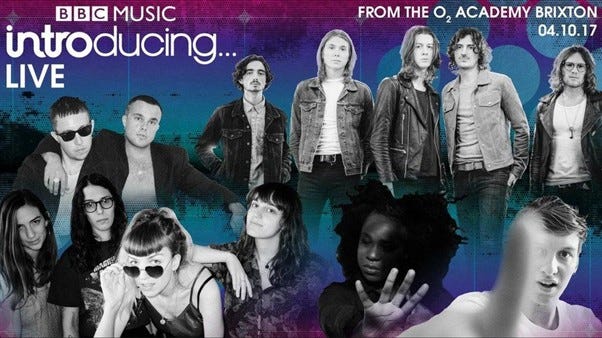
BBC Glastonbury Festival coverage
BBC Reading Festival coverage
BBC 6 Music Festival
Coldplay Live at Whitby Abbey
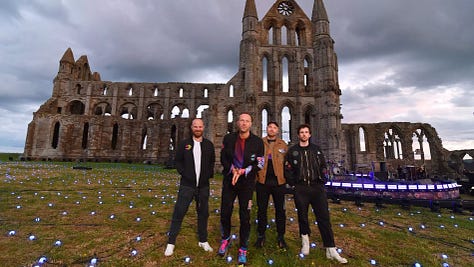
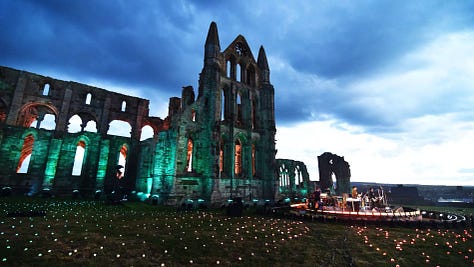
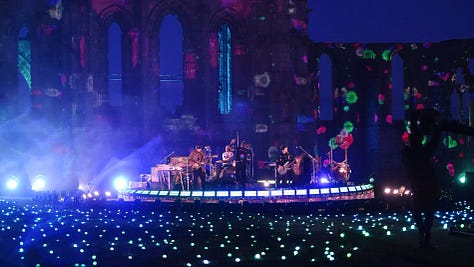
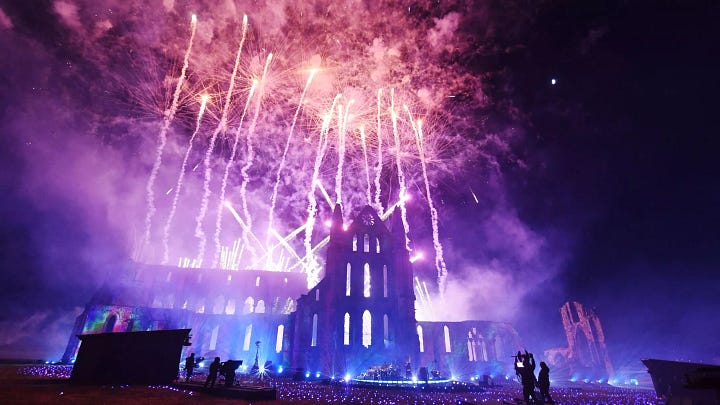
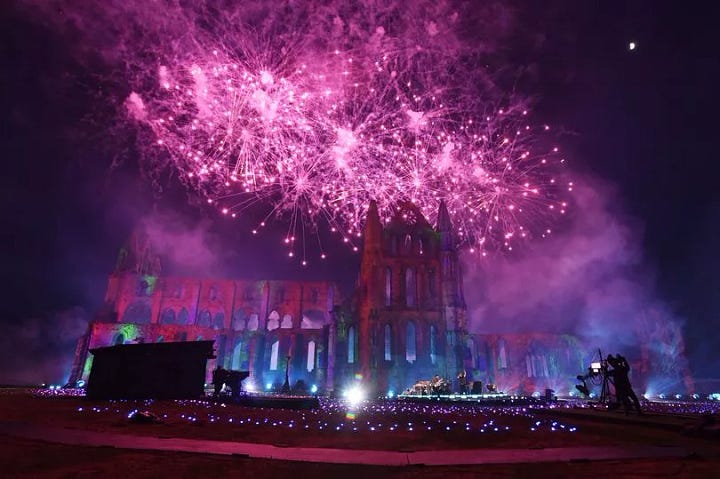
Whitby pictures from and credited to:-
There will be more about many of the BBC shows that we have worked on in future posts.
Working with Local Independent Radio Stations
Whilst working at NUS, I also become involved in a series of events with Local Independent Radio Stations. In the 1970s, Independent Local Radio (ILR) stations, which were commercial radio stations, began broadcasting across the UK. Some of the first ILR stations to launch in the 70s included Capital Radio in London, Radio Clyde in Glasgow, BRMB in Birmingham, and Piccadilly Radio in Manchester. Other notable stations that launched during this period included Metro Radio in Newcastle, Swansea Sound in Swansea, Radio Hallam in Sheffield, and Radio City in Liverpool.
Here's a more detailed look at the ILR stations of the 1970s:
1973:
Capital Radio launched in London.
Radio Clyde launched in Glasgow.
1974:
BRMB launched in Birmingham.
Piccadilly Radio launched in Manchester.
Metro Radio launched in Newcastle.
Swansea Sound launched in Swansea.
Radio Hallam launched in Sheffield.
Radio City launched in Liverpool.
These stations played a significant role in shaping the UK's radio landscape, providing local content and alternative programming to the BBC's national radio services.
Capital Radio hosted a "Freshers' Hop" in 1978 at the Lyceum. Capital Radio was one of the first commercial radio stations in Britain and its focus was on entertainment. The station's presenters included personalities like Tony Myatt, Roger Scott, David Symonds, Tommy Vance, and Kenny Everett. Capital Radio organized the event to welcome new students and offer them a fun time and I was involved in assisting with the delivery and promoting this to London Freshers.
The success of this event then led to the NUS organising a series of ‘Freshers Hops’ as part of a ‘Freshers Tour’ around the country in 1980 all linked to an ILR Station with tickets being available from the Student Unions at the various colleges and universities within their catchment area.
NUS Entertainments and BRMB Radio 'Fresher's Hop' was held at 'Locarno', Birmingham, as part of the ‘Freshers Tour’.
Piccadilly Radio, Manchester's first commercial radio station, hosted a "Freshers Hop" event to welcome new students to Manchester. Piccadilly Radio was known for launching the careers of numerous radio personalities, including Chris Evans, Andy Peebles, Gary Davies, and others. The station also featured exclusive sessions by local bands, highlighting Manchester's thriving music scene.
Radio Hallam's "Freshers Hop" was a significant event for Sheffield's university students and the station itself.
Metro Radio, specifically its FM station (Metro FM), launched with a freshers hop event to celebrate its new programming and the opening of the Newcastle Metro system. The event aimed to introduce the new radio station to students and the local community.
In the 1980s, Independent Local Radio (ILR) experienced significant growth, with new stations launching across the UK. The second tranche of ILR stations, starting in 1980, included Cardiff Broadcasting Company (CBC) in Cardiff, Mercia Sound in Coventry, Hereward Radio in Peterborough, and 2CR (Two Counties Radio) in Bournemouth. Development continued in 1981 with new stations in areas like Aberdeen, Leeds, and Bristol. Specific ILR stations launched in the 1980s:
CBC in Cardiff (April 11)
Mercia Sound in Coventry (May 23)
Hereward Radio in Peterborough (July 10)
2CR (Two Counties Radio) in Bournemouth (September 15)
Radio Tay in Dundee and Perth (October 17 and November 14)
Severn Sound in Gloucestershire (October 23)
DevonAir Radio in Exeter & Torbay (November 7 and December 12)
The Q-Tips
As well as getting involved with National Events – part of my role at the NUS was to organise the entertainment at the major NUS conferences that were held each year in Blackpool. I would book bands and discos at a number of the main hotels used by the delegates. Looking back at those events once again I recall a favourite act which was ‘The Q-tips’ fronted by Paul Young who had also appeared on RGTC at the same Hatfield Polytechnic site as ‘The Police’.
Q-Tips were a blue-eyed soul and new wave rock band first formed in 1979 from the remnants of the rock group Streetband. Apart from the novelty song ‘Toast’, Streetband had failed to find any commercial success with their two albums London and Dilemma (both released in 1979). Drummer Chalky and guitarist Roger Kelly departed, leaving the remaining trio of Paul Young on vocals, Mick Pearl on bass guitar, and guitarist John Gifford. They then added Dave Lathwell on guitar and Baz Watts on drums. In addition, a four-piece brass section was created plus an Organist.
Constant touring and concert appearances had built a strong fan base by mid 1981.
In time, John Gifford was replaced by Garth Watt-Roy (formerly of Marmalade and brother of Blockheads bassist Norman Watt-Royon guitar, and Blandamer was replaced by Nick Payne. This line-up remained for the rest of the band's career. They appeared on BBC Televisions In Concert, Rock Goes to College and The Old Grey Whistle Test. Concert wise they opened for various acts including Thin Lizzy, Bob Marley and the Average White Band and also toured with After the Fire and supported The Who on their 12 date UK tour in 1981. The Q-Tips broke up in early 1982 when Paul Young signed a solo recording contract with CBS Records.
Paul Young and the Q-Tips became pivotal in my setting up ‘EnTEEtainment’ as a business in 1981 – something that will feature in due course in the continuing series of ‘Dick Head of Production – the Life and Times’…







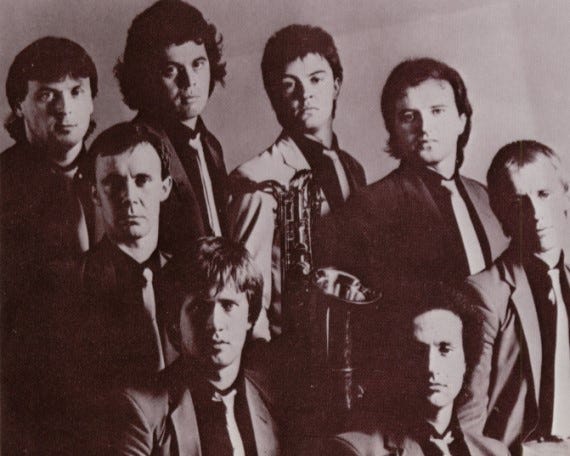
Hi Penny - so glad you are enjoying the posts and finding them interesting - I think there will be many more to come... Very best wishes.
Hi Chris - yes indeed, the student market and the college and university circuit were the launch pad for many a career in the Entertainment and Event Industry - not so much these days but certainly in the 80's.